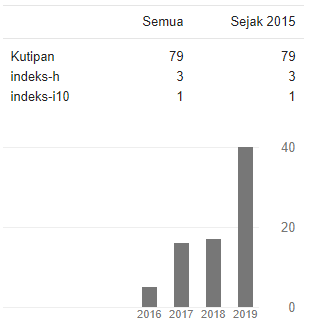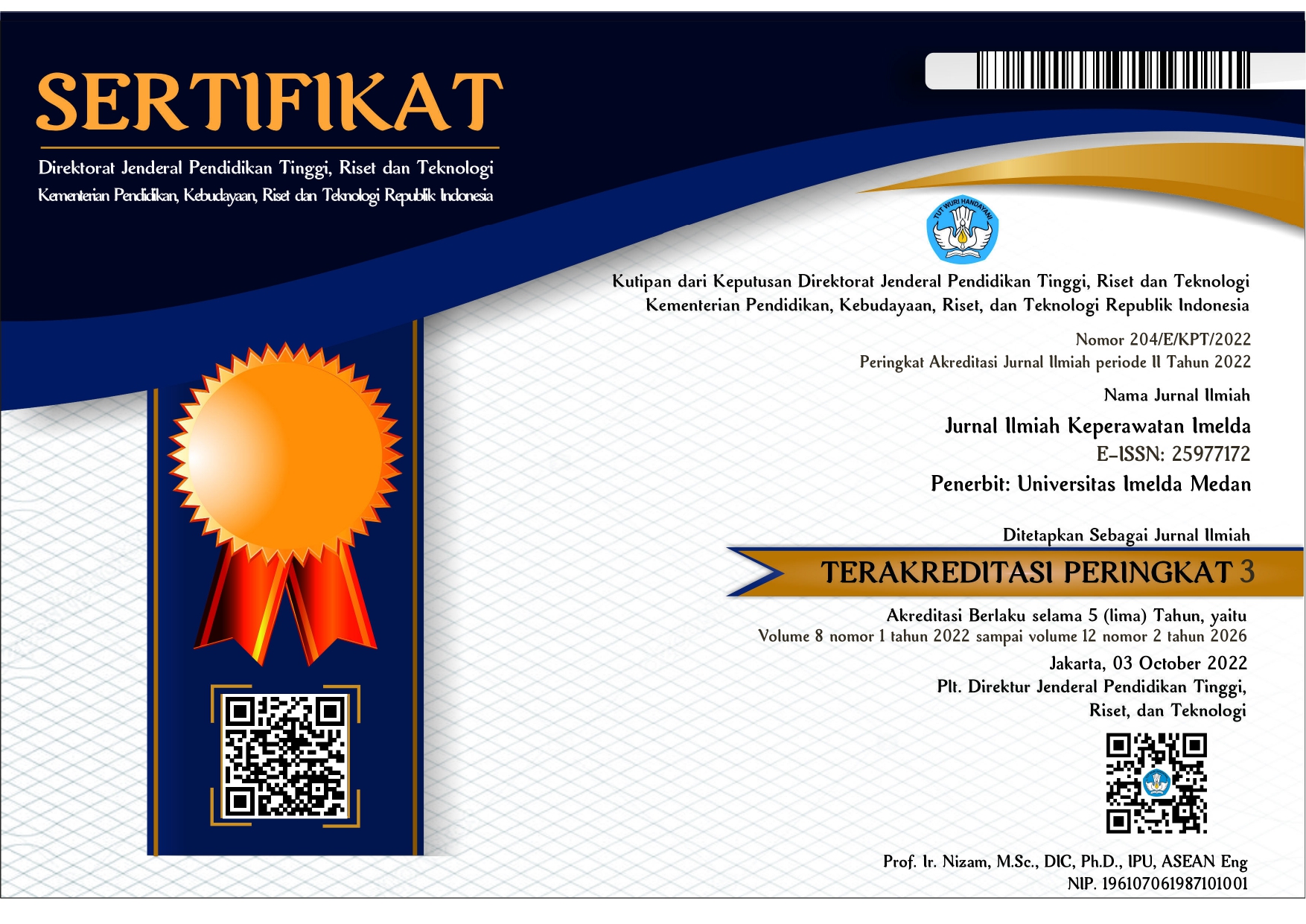HUBUNGAN KREDIBILITAS KOMUNIKASI PETUGAS PENYULUH KB MELALUI FASE AIDCDA (ATTENTION, INTEREST, DESIRE, CONVICTION, DECISION ACTION) DENGAN MINAT BER KB PASANGAN USIA SUBUR (PUS) DI DESA MANUNGGAL TAHUN 2019
DOI:
https://doi.org/10.52943/jikeperawatan.v6i2.435Keywords:
communication credibility, AIDCDA phase (Attention, Interest, Desire, Conviction, Decision, Action), family planning extension officers, interest in family planning for fertile age couples (PUS)Abstract
ABSTRACT
Credibility is a set of communication perceptions about the traits of a communicator. In this case, there are two things: first, credibility is the perception of the audience, so it is not inherent in the communicator, the second is credibility with regard to the characteristics of the communicator. This study aims to analyze the relationship between the communication credibility of the counselor and the interest in family planning for fertile age couples (PUS) in Manunggal Village, analyzed the communication credibility of KB extension officers in Manunggal Village, analyzed their interest in family planning for fertile age couples (PUS) in Manunggal Village. Researchers use the positivism paradigm as a linear communication process that reflects the communicator to change the knowledge (attitude or behavior) of the passive communicant. The results showed that the relationship between the communication credibility of the family planning extension officers on the interest in family planning for fertile age couples (PUS) in Manunggal Village had a significant relationship. The Karl Spearman correlation value was 0.042, it was stated that the relationship between the two variables had a credibility relationship between family planning extension officers and the interest in family planning for fertile age couples (PUS) in Manunggal Village. The credibility of the communication of the Manunggal Village Family Planning extension officers is based on the AIDCDA phase (Attention, Interest, Desire, Conviction, Decision, Action) in conducting counseling on the interest in FP for the Fertile Age Couples which has been implemented quite well even though there are still deficiencies in its implementation. The one who met the most criteria was Attention, where almost all respondents focused on paying attention to the communicator. Meanwhile, those who are in the least position are Conviction, where some respondents choose to talk to their colleagues around their fellow respondents about their belief in choosing the type of family planning that is suitable for current conditions. As for the inhibiting factors experienced in the implementation of socialization, namely psychological, technical barriers and lack of communicators. The interest in FP for Fertile Age Couples (PUS) in Manunggal will be handled properly by PLKB and the local government according to planning, organizing, implementing, monitoring and evaluating the family planning program.
Downloads
References
Azwar S. 2011. Sikap Manusia: Teori dan Pengukurannya. Pustaka, Jakarta.
BKKBN.(2014). Kebijakan Pengendalian Penduduk, Keluarga Berencana, dan Pembangunan Keluarga.http// di www.bkkbn.go.id, diperoleh 18 Maret 2019).
BPPKB. 2015. Pendataan Keluarga BPPKB Deli Serdang tahun 2015.
Dewi, D.M., 2016. “Banyak Anak Banyak Rejeki" vs "Dua Anak Cukup" via Program KB di Kota Batam.Journal of Law and Policy Transformation, 1(1), pp.94-122.
Dinkes Provinsi Sumatera Utara Profil Kesehatan Sumatera Utara Tahun 2015. Sumut: Dinkes
Handayani, S. (2010).Buku Ajaran Pelayanan Keluarga Berencana, Yogyakarta: Pustaka Rihanna.
Hurlock, Elizabeth B. 2004. Psikologi Perkembangan. Alih bahasa : Dra Ishwidayati. Edisi V. Jakarta: Erlangga.
Ikbal, Muhammad. 2011. Pengaruh Motivasi Terhadap Minat Mahasiswa Akuntansi untuk Mengikuti Pendidikan Ppak: Studi Kasus Pada Mahasiswa Akuntansi Universitas Diponegoro Semarang.
Indriyatmo. 2015. Hubungan Antara Dukungan Keluarga Dengan Motivasi Untuk Sebuah Pada Pasien Kanker Yang Menjalani Kemoterapi Di ruang One Day Care RSUD Dr. Moewardi. Diakses pada tanggal 23 Maret 2019 pukul: 21:10
Irianto. 2014. Pelayanan Keluarga Berencana. Edisi ke 1. Bandung: Balai Penerbitan Alfabeta.
Iswandari, N.D., Handayani, L. &Asi, R., 2016. Analisis Perilaku Akseptor Keluarga Berencana Terhadap Metode Kontrasepsi Jangka Panjang di Puskesmas Tewah.Dinamika Kesehatan, 7(2), pp.193-209.
Maksimus. 2014. Komunikasi Terapeutik. Jakarta : Graha ilmu.
Melani, N. (2012). Pelayanan Keluarga Berencana : dilengkapi dengan penuntut belajar). Yogyakarta: Fitramaya.
Nazir, Moh. 2014. metodologi penelitian. Jakarta : Ghalia Indonesia.
Notoatmodjo, S. 2010. Metodologi Penelitian Kesehatan. Jakarta: Rineka Cipta
.2012. Promosi kesehatan, teori dan aplikasi. Cetakan II Jakarta : Rineka cipta.
Nurudin. 2016. Ilmu Komunikasi Ilmiah dan Populer. Jakarta: PT. Raja Grafindo Persada.
Rakhmad, Jalaludin. 2012. Psikologi Komunikasi. Remaja Rosda Karya, Bandung.
Safrida, Viana. 2018. Pengaruh Kredibilitas Komunikasi Penyuluh Lapangan Keluarga Berencana (PLKB) Terhadap Peningkatan Akseptor Keluarga Berencana Di Kota Medan. Jurnal Interaksi, Vol 2 No. 2, Juli 2018, 145-156
Siti. 2015.Komunikasi dan Konselingdalam pelayanan kebidanan.Yogyakarta : Fitramaya.
Sugiyono, 2011. Metode penelitian kombinasi (Mixed Methods).Bandung : Alfabeta .
Susilowati, eva teguh. 2010. Hubungan Minat Menonton Tayangan Film Kartun Laga Di Televisi Pada Agresivitas Siswa SDN Ngimbang Palang Tuban. Diakses pada tanggal 27 Maret 2019 pukul: 20:17
WHO, 2013.Data Penggunaan Kontrasepsi Dunia.
Zuraidah.2017. Pengaruh Pengetahuan terhadap Persepsi Istri dalam penggunaan KB Non Hormonal dalam jurnal bidan. Midewife journal. Volume 3 No.1 Januari 2017









